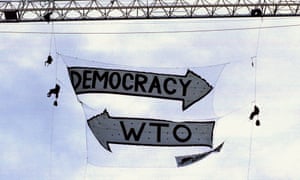Extract from The Guardian
The baby boomers gave us Trump and Brexit. Can my generation age more gracefully?
Generational
politics is bullshit, but a Gen X guy would say that. I sometimes
wonder, though, whether whatever is distinctive in my generation’s
experience (and haunting our minds) might have something to offer the
future.
After a brief flurry of interest in the 1990s, thinkpieces on my demographic quickly waned. There were never that many of us; the meat in the sandwich was and is meagre.
Tired of their younger cousins and brothers, around the turn of the century, boomer pundits pivoted to an obsession with their millennial children. Those children stared back at them with mostly well-founded resentment. Both sides continue to have this out, ad nauseam.
This oedipal struggle has tended to crowd us out; as the New Yorker writer Emily Nussbaum pointed out, Generation X is now sometimes forgotten altogether in articles pondering generational difference. In a tweet Nussbaum called our generation “gloomy, curmudgeonly ghosts”. By trying to relieve the gloom with a self-deprecating wisecrack, she exemplified another generational tic.
"The flipside of the irony and gloom that characterised Gen X culture may be a kind of pragmatic resilience"
This relative invisibility has had many consequences. One is that,
while the economic plight of millennials has been considered at length,
the difficulties of Generation X, which in some ways paralleled or even
prefigured them, have received less attention.After a brief flurry of interest in the 1990s, thinkpieces on my demographic quickly waned. There were never that many of us; the meat in the sandwich was and is meagre.
Tired of their younger cousins and brothers, around the turn of the century, boomer pundits pivoted to an obsession with their millennial children. Those children stared back at them with mostly well-founded resentment. Both sides continue to have this out, ad nauseam.
This oedipal struggle has tended to crowd us out; as the New Yorker writer Emily Nussbaum pointed out, Generation X is now sometimes forgotten altogether in articles pondering generational difference. In a tweet Nussbaum called our generation “gloomy, curmudgeonly ghosts”. By trying to relieve the gloom with a self-deprecating wisecrack, she exemplified another generational tic.
"The flipside of the irony and gloom that characterised Gen X culture may be a kind of pragmatic resilience"
My sliver of Generation X (I’m 45) exited high school into the early 1990s recession. The oldest Xers did the same a decade earlier. On the way to Brisbane for university back then, I remember that each provincial Queensland town I passed through looked like a bomb had hit it. After a brief moment where the same towns were full of jet skis and new utes, post-boom, post-flood, many have now returned to their former state.
This was formative: I for one never expected to find a real job. (Outside a few brief stretches, this expectation has been met).
Although Generation X were the last to taste the fruits of postwar, middle-class stability in advanced economies, they were also the first to see major elements of it snatched away – especially in Australia.
In Australia, after 1989, we didn’t receive a free higher education as many baby boomers did (I still have student debt). We were the first whose adult lives unfolded entirely under the cold skies of a “reformed” neoliberal economy, with weakened worker power and radically diminished job security (not to mention social security). We were the first not to exceed their parents in terms of many markers of wealth and success.

Grunge – both the Seattle-born musical genre and the short-lived Australian literary movement – aestheticised the conditions of unemployed dirtbaggery that the 1990s forced upon us.
Praise, the ur-grunge-lit novel by recently deceased Brisbane writer Andrew McGahan, blankly told the story of Gordon, a man who lives in a boarding house, and drifted drunk and aimless through his life. Gordon can’t be described as a failure because there’s little indication that he’s really trying.
To the extent that Generation X received much attention, it was during this period: the time when we — and our designated generational representatives — were declaring ourselves creeps, losers, slackers. It may have displaced analysis away from the structural causes of our failure to economically thrive, but there are worse coping strategies.
Other more militant expressions of disenfranchisement that were not simply generational appeared in hip-hop. NWA’s records anticipated the grimness of much of the alt-rock boom but transmitted the devastated post-Reagan social landscape of the United States much more vividly. Hip-hop was also more specifically targeted for censorship in the wake of the Los Angeles riots. During the 1990s Australia’s pop culture institutions, such as Triple J mostly shut out hip-hop altogether.
The achievement in all of this cultural expression was to take seriously the idea that there may be no golden future. Some of it questioned the idea that there may be any future at all.
Unfortunately (for some of us at least) a future has after all arrived. According to most definitions that offer precise generational boundaries, Generation X are those born between the mid-1960s and the late 1970s. (Boomers and millennials even get to inhabit larger slices of time, with two decades apiece).

But now, some boomers have hardened; too many are shouty Facebook uncles or Nimby aunts. Not all boomers are reactionary, or economically privileged, of course. But disproportionately it is boomers – especially white boomers – who elected their generational counterpart Donald Trump president of the United States. Also, boomers disproportionately voted in favour of the United Kingdom leaving the European Union.
Given its more cramped and gloomy formative years, can Generation X age more gracefully? Once again, the answer may come in the midst of circumstances we would not have chosen, given the chance. The tests ahead are sterner than those that any generation has faced in some time.
Generation X will grow to old age in a world which (it seems inevitable now) will be ravaged by the effects of climate change. We may be the last to grow old in anything resembling a stable form of modern civilisation.
The stresses currently warping politics in liberal democracies are set to become worse. There will be more refugees as a result of climate change, and the refugee crisis may hit even closer to home: parts of Australia and the American south-west will be effectively uninhabitable. Some places are almost there already.
Our economies are likely to be irreparably damaged as cities and towns are repeatedly pounded by storms, wildfires and floods. We may not be able to grow enough food — we may even have trouble pollinating some food plants due to the decline of insects.
As resource constraints increase, so will conflicts over them. Wars of all kinds – civil, global – will be more likely in a world turning upside down. A new book by David Wallace-Wells, The Uninhabitable Earth, spells out all of the likely consequences in detail.
The boomers can take comfort in the fact that most of them will be dead before the worst of this arrives from the middle of the century. Generation X will likely face dire crises in what may otherwise have been its golden years. Those of us with children have even more to worry about. When we understood, early, that we may not do as well as our parents did, we didn’t know the half of it.
To the extent that the world looks to the old for wisdom, we will be in the hot seat. What will we do? What advice can we give? We may be better prepared for it than we imagine.
For one, some of us have been hearing about climate change since we were schoolchildren. We are far less likely to deny the realities of what is happening than our predecessors. (Research in the US suggests an age gap on climate change – only 31% of 65+ Americans in 2015 believed it was happening due to human activity, whereas majorities did in all age groups under 50).
So we may be more prepared to recommend or support radical solutions in a way that our complacent elders have not.
We also have a radical political history of our own, which the culture has not memorialised, which too many of us have forgotten, and which we may be able to draw on.
In 1992, LA erupted in response to police violence. Throughout the 1990s, the pioneers of third-wave and intersectional feminism challenged all expressions of misogyny, patriarchy and homophobia.

This protest wave was interrupted by 9/11, the so-called war on terror, and the subsequent ramping up of security states around the world.
There will be plenty of authoritarian solutions preferred for what’s coming down the pike. Eco-fascism is on the march; its solution to the climate crisis is genocide. “Normal” conservatives will seek to build walls and detain or refoul the desperate, and if recent history is any guide, the centre-left will dutifully maintain them. The radical left, too, has succumbed to the temptation of authoritarianism in the past in the face of perceived disorder and subversion.
As the last who remember the cold war, who were adults as the war on terrorism began, it is up to us to remind people why they must resist such solutions. It is up to us to preserve, as long as we can, the memory of what flourished in the gaps during the 1990s as the world transitioned from one system to another.
The flipside of the irony and gloom that characterised Generation X culture may be, if we can maintain it, a kind of pragmatic resilience. We have survived. Any future that may be left to us is a bonus. We were never really in charge anyway, so let’s keep rolling with the punches.
Most importantly we must, as we age, know when to exhibit what may be our best trait, and a skill that the boomers never mastered. We must remember when to fade into the background, when to let others say their piece. We should endeavour to become, where circumstances require it, like ghosts.
• Jason Wilson is a Guardian writer and columnist

No comments:
Post a Comment